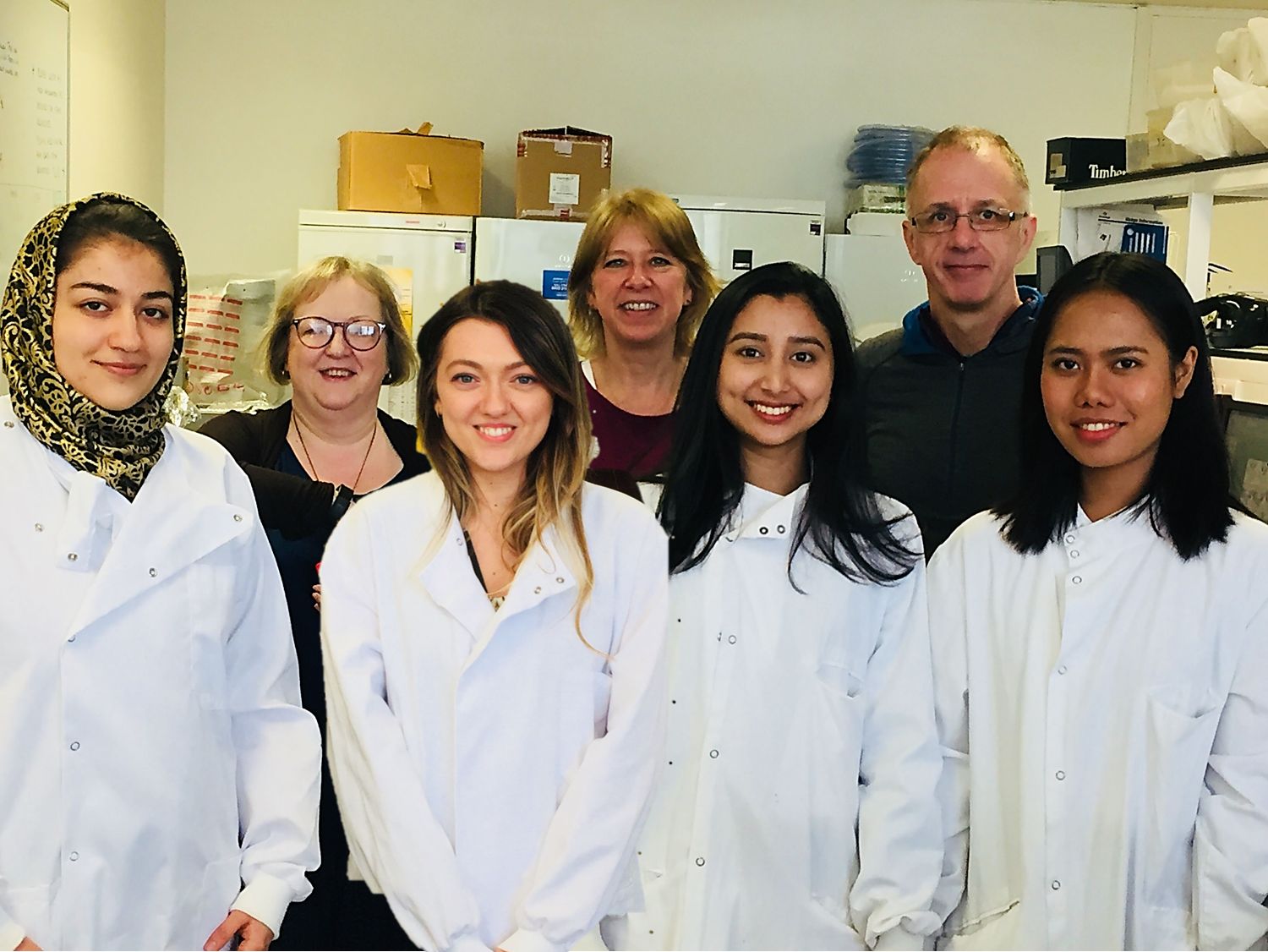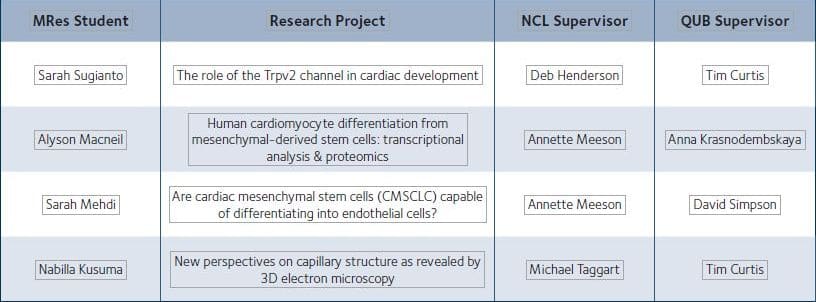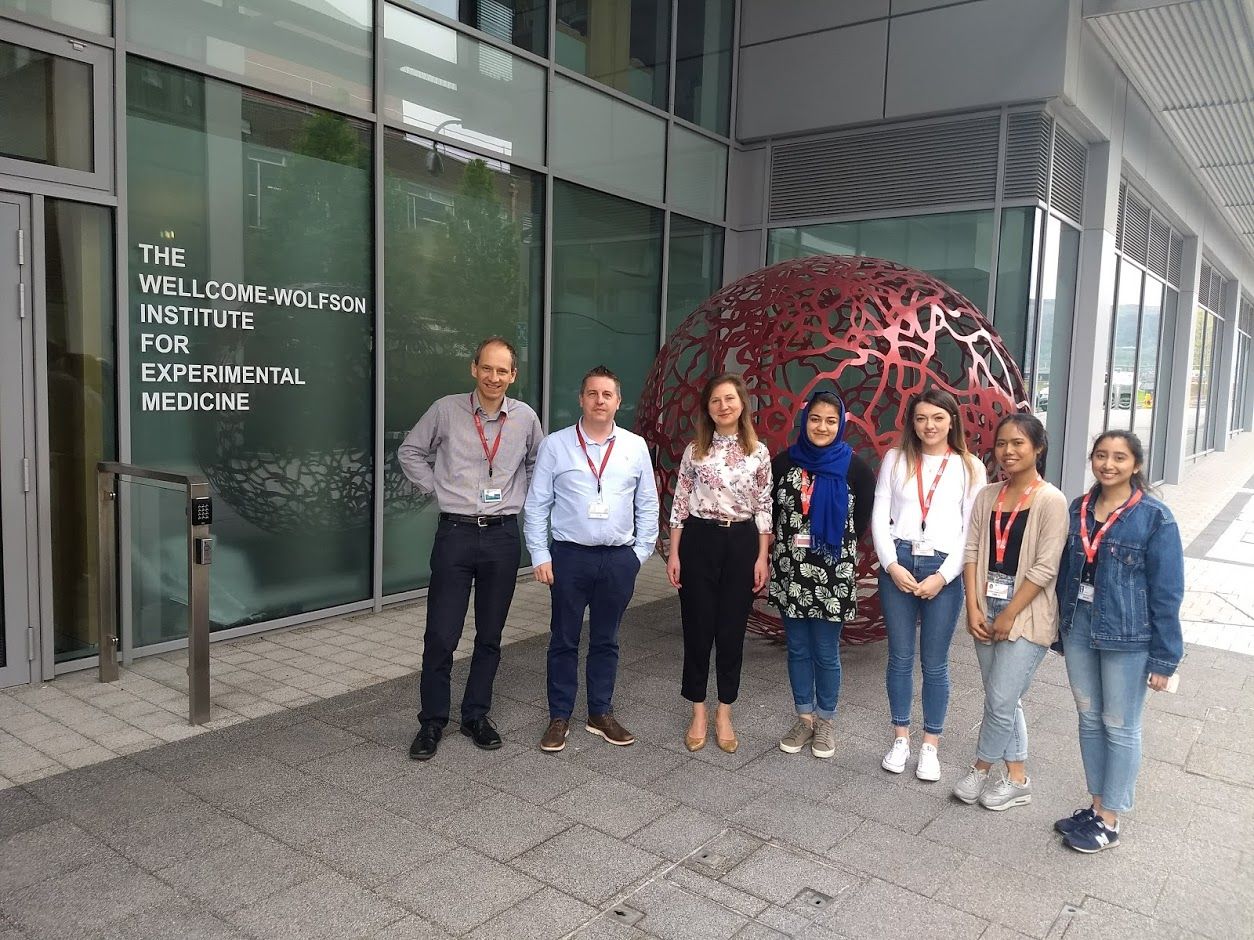
Physiology News Magazine
Expanding inter-institutional opportunites for Masters research students
Membership
Expanding inter-institutional opportunites for Masters research students
Membership
Michael Taggart , Newcastle University, UK
Tim Curtis, Queen’s University Belfast, UK
https://doi.org/10.36866/pn.112.48

In this article, Michael Taggart and Tim Curtis (previously co-Theme Leads for Vascular and Smooth Muscle) comment on the rise of Masters research programmes and the challenges this places on universities to provide courses suitable for the future careers of students. Fostering inter-institutional arrangements may therefore present opportunities to grow the physiology discipline.
In the last decade or so there has been a notable change in the postgraduate research student landscape. Universities have increased not only the number but also the breadth of Masters degrees offered. This extends to incorporating lengthy research components and examinations by assessment of a substantive thesis/dissertation – typically as MRes (Masters by research) or MSc (Master of Science) programmes.
Numerous life science graduates are attracted to Masters degree programmes where the research project component is often 4–6 months in duration and individualised to each student. For many students enthused by their undergraduate final year research projects, this option helps them reach a better-informed decision about future steps. Also, in the competitive post-graduate training/career market, the acquisition of extra research training and skills may be beneficial to their next moves. The 1+3 years model of Masters/PhD training organised by many funding bodies including the MRC, BBSRC, Wellcome Trust and BHF recognises this to be so. Medical students too are choosing to intercalate in Masters degree programmes to increase their breadth of training relevant to clinical academic pathways.
There are evolving challenges, however, to the delivery of research-intensive Masters programmes. A principal one is that the trajectory of biomedical research is increasingly multidisciplinary. This raises the query: how can we best support student research training needs in this fluid setting?
This question spurred the establishment of a pilot link-up between the Cardiovascular Research Centre (CVRC) and Institute of Genetic Medicine (IGM) at Newcastle University and the Centre for Experimental Medicine (CEM) at Queen’s University Belfast (QUB)1-3. This academic year, four Newcastle students – studying for a MRes in Cardiovascular Science in Health and Disease4 or MRes in Stem Cells and Regenerative Medicine5 – undertook research projects with co-supervision by staff at QUB (Table 1). The students spent one week immersed in the CEM laboratories to get first-hand experience of the approaches used by the partner supervisors. Funds supporting the exchange were provided by IGM and CEM. Moreover, the co-supervision/collaborative arrangement fostered exchange of expertise (e.g. experimental protocols involving advanced electron microscopy and image analysis), materials (e.g. transfer of animal model cells and tissues) and data (e.g. single cell sequencing) between the respective laboratories, thereby adding breadth and substance to the research projects. Student feedback was positive, with suggestions for the exchange visit to be longer or more frequent consistently cropping up! Therefore, we hope to build on this pilot arrangement in future years. This could include: (i) establishing bilateral links whereby QUB-based students studying for an MSc in Experimental Medicine6 have the opportunity of co-supervision by, and visits to, staff from CVRC/IGM in Newcastle; (ii) the possibility of awarding joint MRes degrees. Of course, these developments would require more secure funding arrangements.
Is there a role for physiology in expanding such inter-institutional opportunities?
There are 32 MRes programmes in Newcastle University – none feature ‘physiology’ in the title. This is despite the BSc physiology undergraduate degree programme consistently rating highly in national/international surveys7. Similarly, physiology forms a a key component of various undergraduate degree programmes at QUB (e.g. medicine, biomedical sciences, pharmacy, dentistry and nursing) but there are no Masters programmes specifically in physiology. Clearly, there are opportunities to (re)emphasise a positive role for physiology through Masters research degrees. Equally, the multi-disciplinary research environment favours the involvement of theoretical and practical contributions from physiology. Many Masters courses emphasise the integration of fundamental science with medicine in taught modules. This requires detailed consideration of the transition from physiology to pathophysiology. The students will appreciate this if we, as instructors, remember to call it so. Fostering inter-institutional arrangements may increase opportunities to grow the physiology discipline.

How can The Physiological Society contribute to this research training landscape?
Many students wishing to foster research-oriented careers (whether it be for a PhD, industry or NHS-related clinical scientist positions) see a need for more research training and practical experience than is acquired at undergraduate level. It follows that much physiology-relevant research training now occurs during MRes/MSc postgraduate degree research projects. Therefore, it may make strategic sense for The Physiological Society to actively promote and/or engage in this area of student training. We offer the following suggestions for starters:
- An application round for MRes/MSc research projects to be sponsored by The Physiological Society: PIs could flag physiology-related projects that could be submitted to The Physiological Society for consideration for sponsorship. If deemed within a remit (e.g. for skills training, topic, etc), The Society could, for instance, pick up the consumables tab (usually towards£3k). The student could write a report of the work for The Society at the same time as submitting their thesis for examination. This would have the added strategic value of embedding ‘physiology’ in the mindset of university administrators of MRes/MSc programmes.
- Similar to (1) but the Society would sponsor students to carry out research across two institutions. With all the requirements as (1) in terms of physiology relevance, the sponsorship here would be to support student accommodation(s) when visiting the 2nd institution
(predicted again to be in the £3k region). This would broaden the reach of physiology-sponsored projects across multiple institutions. - The Physiological Society would co-sponsor MRes/MSc research projects with industrial/healthcare partners. This could be in alignment with (1) or (2) whereby the project required access to, and use of, certain resources (hardware, software, drugs, antibodies, etc.) or visiting the outside partner. Students and universities are keen on these types of arrangements (i.e. developing transferable skills for the workplace), and companies would benefit from engaging with current university research activity.
We hope that this commentary encourages a broader debate on the delivery of MRes/MSc research-orientated programmes of study and we look forward to hearing of other experiences and suggestions for the promotion of physiology through these schemes.
References
- https://www.ncl.ac.uk/cardio/
- https://www.ncl.ac.uk/igm/
- https://www.qub.ac.uk/research-centres/CEM/
- www.ncl.ac.uk/postgraduate/courses/degrees/cardiovascular-science-in-health-disease-mres/#profile
- www.ncl.ac.uk/postgraduate/courses/degrees/stem-cells-regenerative-medicine-mres/#profile
- https://www.qub.ac.uk/courses/postgraduate-taught/experimental-medicine-msc/
- http://www.ncl.ac.uk/press/articles/latest/2018/02/qsbysubject2018/

